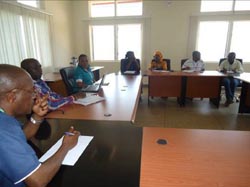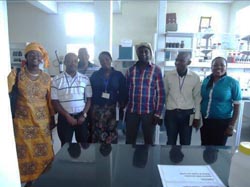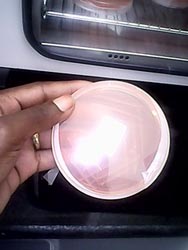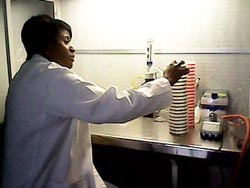N2Africa and the Humid Tropics
On 29th July 2014, the N2Africa DRC team attended a workshop at Bodega hotel to plan activities for the Mega Program Humid Tropics. Many organizations and their partners1 joined this meeting to familiarize themselves with the activities undertaken by every program or project, to detect the complementarities between these projects/programs and to identify the gaps to be covered for the East of DR Congo.
The Mega Program Humid Tropics has five entry points: Productivity, Natural Resource Management, Nutrition, Politics and Markets, and Gender and Youth. In the workshop, we planned all activities around these five entry points. All the stakeholders identified the gaps and targeted the general theme to cover for the season A 2015 (starting early September 2014). The following themes were maintained by all the stakeholders:
- Nutrition
- Markets and credit access
- Integrated management of banana-legume system
- Credit access
- Integration of livestock in the cultivation systems
- Integration of trees in cultivation systems
- Post-harvest handling of cassava, banana and soyabean
N2Africa’s expertise will be used to contribute to the program in different ways. Firstly, N2Africa will introduce soyabean varieties rich in protein. This contributes to the nutrition goal. Secondly, N2Africa will assist in dissemination of cultivation systems that improve productivity of legumes associated with other cultures like cassava, banana and maize. Related to this, N2Africa will disseminate the use of inoculants for legume production. Thirdly, N2Africa will provide its expertise in capacity building by training master farmers and farmers using radio and other means, like demonstration and participative monitoring and evaluation.
N2Africa’s partnership with Women for Women
On 30th July 2014, the N2Africa DRC team and the direction team of Women for Women (WfWi) met at IITA’s Kalambo station. In this meeting we discussed and formalized the partnership between the two organizations for the second phase of N2Africa. In the first phase, WfWi already trained more than 837 female household heads in Uvira (South Kivu) and Goma (North Kivu) in N2Africa technologies (Inoculum, ISFM, business plan, market and credit access). The approaches used to achieve this goal were demonstrations trials, seeds multiplication fields and sharing experiences between farmers. For the second phase, N2Africa and WfWi target to train 4000 women per year. At the end of the meeting, the N2Africa coordinator and the WfWi direction team renewed and updated the MoU and agreed to meet for further planning the activities of Season A, 2015 that starts early September.
 |
Left: Meeting participants Right: From left to right: WfWi officer in charge of partnership, WfWi vice director, WfWi income generator, N2Africa DRC coordination, WfWi field technician and N2Africa Research technician |
 |
Rhizobiology activities continue in Phase II
One of the goals of the N2Africa Rhizobiology activities is to discover new and better strains for use in legume inoculants. In the projects’ first phase, the D.R. Congo Rhizobiology team completed the collection of isolates and the characterization of strains. They also assessed the symbiotic capacity of strains and compared strains currently included in inoculants. 107 isolates were recovered and tested for effectiveness and competitiveness in the greenhouse. From those experiments, four strains were identified as effective and highly competitive compared to the commercially used strains USDA110 and SEMIA 5019. The identified strains are presented as candidate elite strains from DRC.
Rhizobiology activities are continuing during Phase II. So far, the following activities have been performed:
- Culture refreshment and database updating;
- Comparing the four candidate elite strains with the inoculants Biofix Legume Inoculant from Kenya and Rhizobiumu from Rwanda in pot experiment in the greenhouse;
- Long storage of the candidates elite strains (by lyophilization);
- Quality control of inoculants (including Biofix);
- Production of inoculants using different carrier materials.
|
Culture refreshed |
Cultures concentration on rotary shaker |
Ultra freezer for long storage facility |
Rhizobia culturing media preparation
|
Jeanmarie Sanginga
1 The workshop participants included the projects or programs SARDC/IITA, DIOBASS, CIALCA, IFAD, Legume CHOICE, HARVEST PLUS, ICCO Cooperation, SARCAFF, ACOSYF, BIOVERSITY and N2Africa Program, the research institutes INERA and CRSN Lwiro, the government services SENASEM and IPAPEL, the universities U.E.A and U.C.B), and local organizations and agro-dealers.





